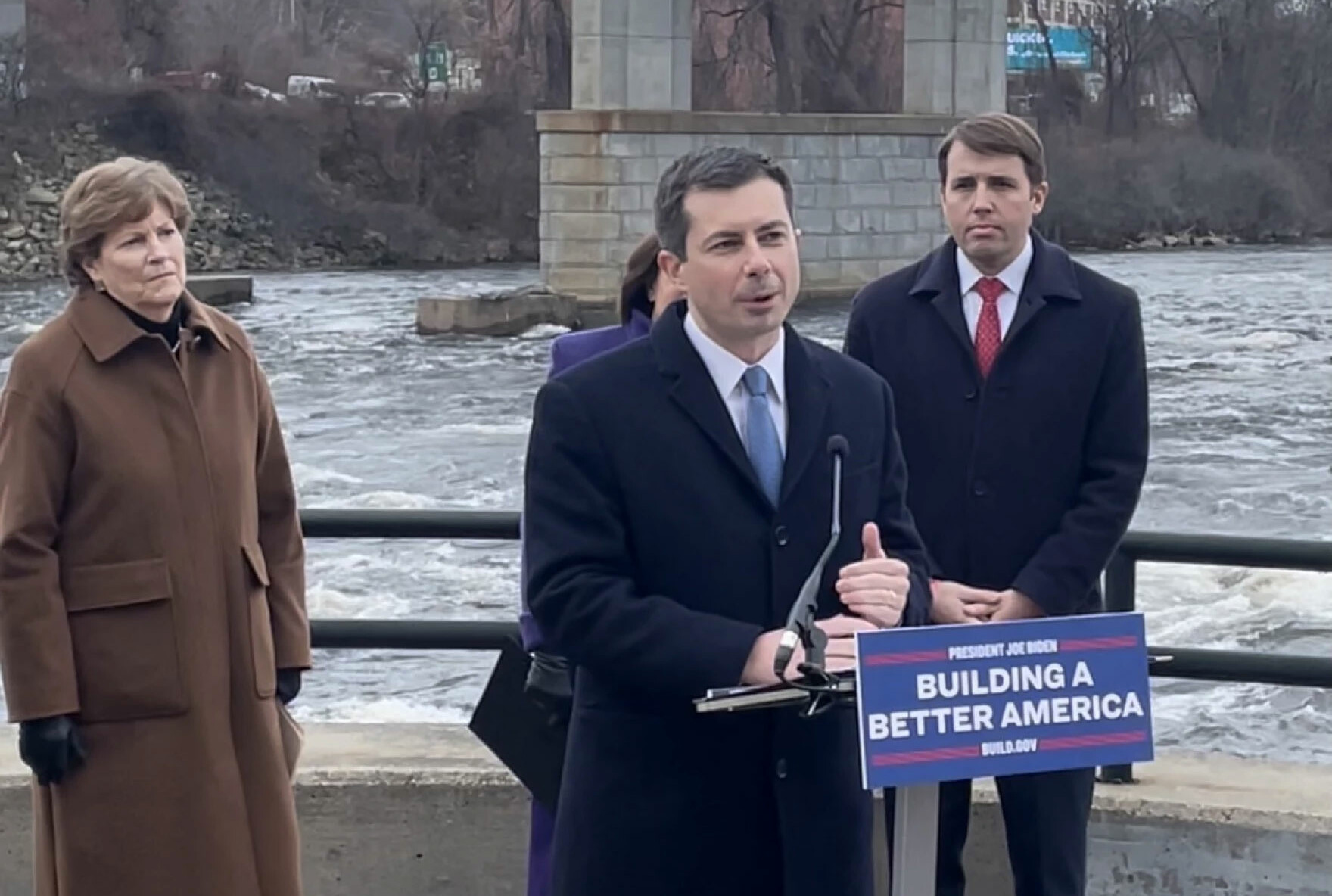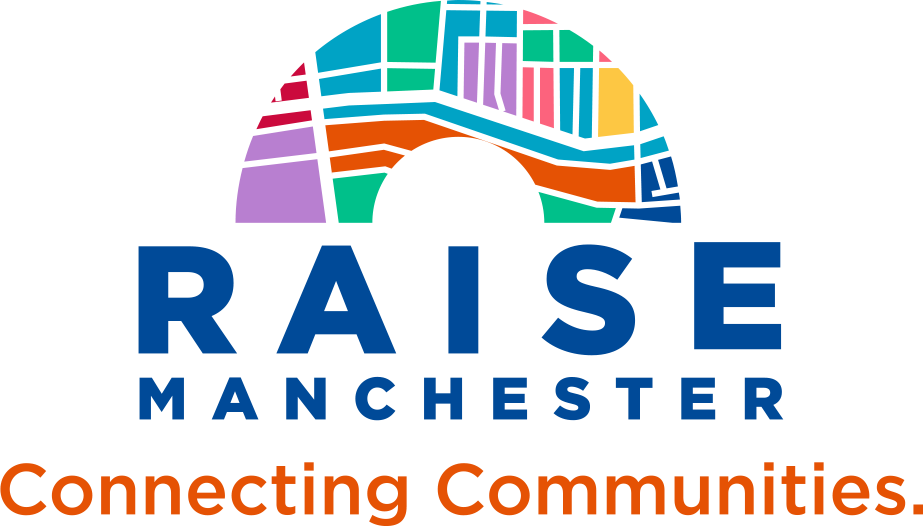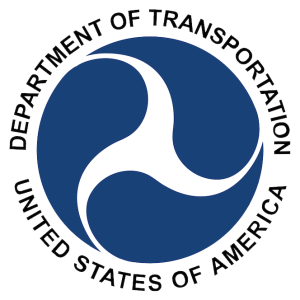

Original post can be viewed here.
MANCHESTER, N.H. – U.S. Secretary of Transportation Pete Buttigieg visited Manchester on Monday to talk about the future of passenger rail in New Hampshire and promote the Bipartisan Infrastructure Law.
“Whether it’s a new rail proposal or the next grant project that comes along, infrastructure will be so important to the future of this community and this region,” Buttigieg said.
At a press conference, he reviewed the funds New Hampshire would receive, including $1.4 billion to improve roads and bridges and $126 million to improve public transportation, among other provisions.
New Hampshire’s congressional delegation, Manchester Mayor Joyce Craig and Nashua Mayor Jim Donchess joined local business, labor and environmental leaders to talk with Buttigieg about a longstanding effort to create a passenger rail line connecting Boston and Southern New Hampshire.
While officials and community leaders said that expanding passenger rail would provide benefits for jobs, tourism, and the environment, it has been a controversial issue in New Hampshire, with some opponents saying the costs outweigh the benefits. And the commuter rail system currently serving New Hampshire, the Downeaster, has seen operating costs climb faster than ridership.
In an interview with NHPR, Buttigieg pushed back on the idea that rail was a political or partisan issue.
“Whatever we can do to simplify the ability of people and goods to move where they need to be, we should be doing it. Commuter rail can be a big, big part of that,” he said. ”The more that story is told, the more we can move past the idea that there’s anything political or partisan about the idea that Americans deserve to have excellent rail service, just like people in pretty much every other developed country take for granted,” he said.
Buttigieg also said rail systems become more efficient and effective as they grow, citing airline travel as an example of a mode of transportation that began to “click economically” as smaller airports connected more of the country.
“Let’s also recognize that there is no mode of transportation that doesn’t have taxpayer support in some way, shape, or form,” he said. “Certainly driving is something that gets a lot of support in terms of public investments in roads and other things that make it possible to get around.”
Many participants said they were excited to see movement on the years-long discussions about the expansion of passenger rail in the state.
The infrastructure law dedicates $66 billion to passenger rail, the largest investment since the founding of Amtrak. Amtrak has proposed a commuter train linking Boston, Manchester and Concord.
“It seems like it’s getting real,” said EJ Powers, a spokesperson for New Hampshire Business for Rail Expansion. His group worked to pass legislation that funded project development efforts for another rail initiative, the Capitol Corridor project, that would connect Boston with Southern New Hampshire.
Rail hasn’t received a lot of support from the state. In New Hampshire’s 2021-2030 transportation improvement plan, rail received less than 1% of program funds.
But for Mike Skelton, president and CEO of the Greater Manchester Chamber of Commerce, rail is a pressing issue. “When are we getting rail?” is one of the top questions he’s asked by business leaders, and it’s been like that for at least a decade, he said.
“The business community is ready for this project. And they know that the economic impact is going to be transformational,” he said.
In Southern New Hampshire, Skelton said the development of train stations poses an exciting economic opportunity. He was optimistic that the economic growth from commuter rail would lead to statewide benefits for Granite Staters.
Buttigieg said though the Department of Transportation doesn’t weigh in on projects at this stage, he saw the local enthusiasm for rail as a good sign.
“We do see how a project like this is a really compelling vision,” he said during the roundtable.
One of the Department of Transportation’s strategic goals is to put transportation — the sector with the largest share of emissions in both New Hampshire and the United States — at the center of climate solutions.
Buttigieg told NHPR that for a state like New Hampshire, where commuters rely heavily on cars, he sees electric vehicles as a promising option to green the transportation system.
“Americans will always be drivers, so we also have to make sure that we’re supporting a transition to electric vehicles,” he said. “We’ve got to have more charging infrastructure and we’ve got to act to make them more affordable, which is part of what’s in the Build Back Better plan.”
Rural drivers, who may drive longer distances and spend more money on gas, are among those who stand to benefit most from a transition to electric vehicles, Buttigieg said.
At the discussion, Arnold Mikolo, New Hampshire’s Environmental Justice Community Advocate at the Conservation Law Foundation, said passenger rail presented an opportunity to improve our environment while improving the quality of life for communities disproportionately impacted by environmental issues. He also expressed excitement about the Justice40 initiative, to deliver 40% of the benefits of federal climate investments to historically underserved communities.
While in Manchester, Buttigieg also highlighted a $25 million RAISE grant the city received from the Department of Transportation to connect the South Millyard District with downtown Manchester and other neighborhoods.
Between the RAISE grant, improvements in roads and bridges, and the possibility of funding for new passenger rail projects, Mayor Joyce Craig said her outlook on the future was bright.
“The investment coming into Manchester over the next decade will completely revitalize our community,” she said during the press conference.
Shoshanna Kelly, an Alderwoman at-Large and business owner in Nashua, shared her story of spending four hours a day commuting between Nashua and Boston.
She says she developed a “bus family,” who she would talk with about the development of commuter rail, and how it might never happen.
“I’m really grateful that we have that opportunity now to prove that wrong,” she said. “That is a lot of time away from family. It’s a lot of time that you can’t make it to the softball games.”




